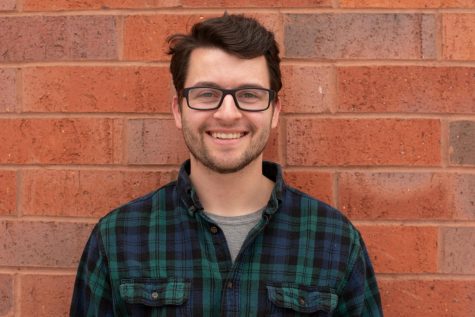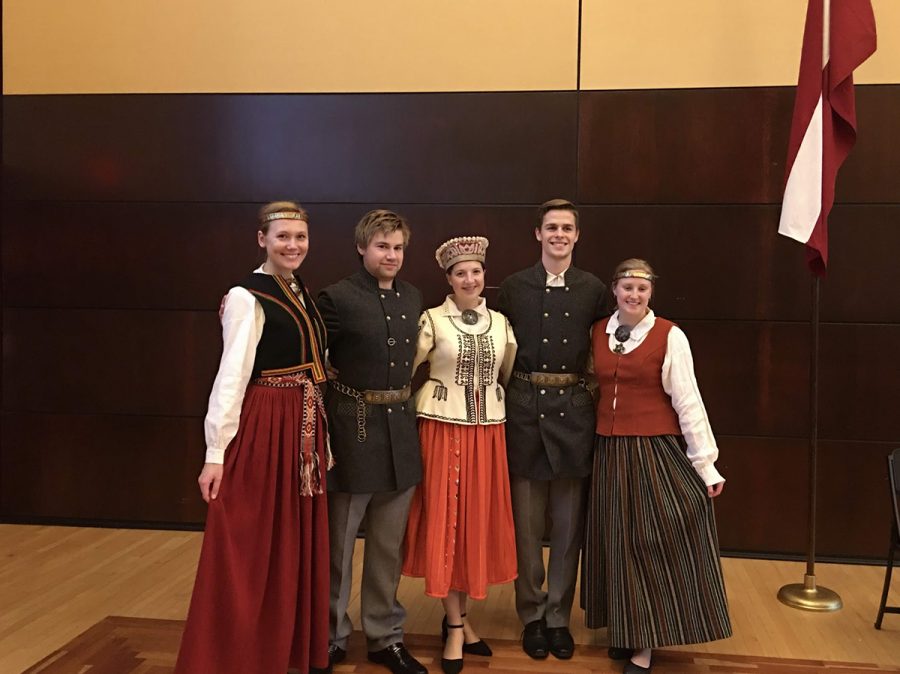Celebrating other cultures unifies people
The Baltic Student Organization celebrates 101 years of Latvian independence
Photo by Submitted
Members of the Baltic Student Organization dressed in traditional Latvian costumes Left to right: Zane Klavina, Michael Carini, Una Arbidane, Valts Blukis and Samantha Strelnieks
The Baltic Student Organization hosted a public celebration for the 101 years of Latvian independence on Monday, with about 30 people in attendance.
The event was a ton of fun; but more importantly, I feel it unified those who attended.
“I was surprised so many people came,” Zane Klavina, an international student from Latvia, said. “We asked a lot of people and I told all of my classmates to come and I wasn’t expecting (so many) to come.”
There were people from all sorts of fields — from marketing majors to history majors — including current and retired professors of UW-Eau Claire.
“It varies from year-to-year,” Klavina said. “But they definitely do something every year on (Latvia’s) Independence Day.
The group had a presentation that explained a lot of the history and culture of Latvia, noting the occupation of Nazi Germany and the Soviet Union in the country during the 20th century.
What I found most interesting is that in 1989 – two years before the Berlin Wall fell – there was a demonstration of approximately two million people from three different Baltic states. They held hands and made a wall of themselves that stretched 600 kilometers long. The event is referred to as The Baltic Way.
This unifying wall was in protest to the polarization of the Soviet Union which, at the time, had control of Latvia.
Alongside learning about their history, we sang the national anthem of Latvia and ate traditional Latvian foods or Latvian recipes of familiar foods.
Being a huge foodie, I can confidently testify that they tasted incredible, and I asked Klavina for the recipes as well.
There were three main foods, which were a cheesecake made using a Latvian recipe, Pīrāgis, which Klavina described as a sort of meat pie and Klinģeris, which is a traditional birthday pastry.
It was a true celebration of history, culture and pride.
And that’s what I find fascinating.
Only three people who attended were actual Latvians, and a fourth whose parents are Latvian; yet, there we were, celebrating a country that most of us presumably knew little or nothing about.
It didn’t matter. The crowd seemed to genuinely enjoy it.
Even when the event was over, the students of the organization stayed after to entertain the questions and curiosities of a lot of the guests. Personally, I stayed another 30 minutes to listen and participate in these conversations.
What I saw was people who were interested and becoming personally invested in something that was – literally and figuratively – foreign to them.
I think this world would be much better if we made more attempts to relate to, understand, and learn about the history and culture of others among us, and abroad.
In news that seems to me all too recent and recurring, which is still being investigated, it is more important to me now to learn about differences in culture and history than in my three previous years here at UWEC.
So next time you’re putting on your jeans – which are considered an American classic – remember that it wasn’t an American-born citizen that made them, but instead Latvian immigrant Jacob W. Davis that made them.
Seward can be reached at sewardwv9140@uwec.edu.

Will Seward is a fourth-year creative writing major, minoring in physics and chemistry. Alongside The Spectator, he is also a co-host for Blugold Radio Sunday's shows: Blugold Literary Broadcast and How'd You End Up Here? Outside of these roles, he enjoys typewriters, photography and petting dogs.


